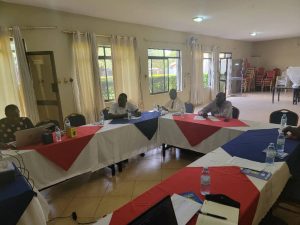On 27th June 2025, stakeholders convened to participate in an inception meeting for the research project titled, “Pregnancy in Sickle Cell Disease: Experiences of Women with Sickle Cell Disease in the Use of Maternal Health Care Services in Uganda.”
The research project that sought to highlight the lived experiences of pregnant women with sickle cell disease, a population often underrepresented in maternal health research.
Despite improvements in medical interventions and advocacy efforts that have led to longer life expectancies for individuals living with sickle cell disease, pregnant women with the condition continue to face significant health risks. These include preterm births, low birth weights, postpartum hemorrhages, and an increased vulnerability to social stigma, all of which can result in delayed medical care or hidden pregnancies.
The research initiative is an important step towards ensuring that all women, regardless of their health status, have access to the care and support they need during pregnancy. Through the combined efforts of healthcare providers, civil society organizations, and academic institutions, Uganda can move closer to a future where sickle cell disease no longer presents a barrier to healthy pregnancies.
This research project is being implemented by Dr. Peninah Agaba, a Lecturer at the Department of Population Studies, under the College of Business and Management Sciences at Makerere University. Dr. Agaba is a doctoral fellow on the Consolidating Early-Career Program at Makerere and other Public Universities (CECAP II postdoctoral).

The inception meeting held both physically and virtually was hosted at the Grand Pacific Hotel in Lira in Uganda. It brought together a diverse group of stakeholders, marking a critical step towards addressing maternal health challenges faced by women living with sickle cell disease (SCD) in Uganda. Among the participants were: Dr. Ocen Patrick Buchan, District Health Officer (DHO), Dr. Allen Kabagenyi, Head of Department of Population Studies at Makerere University, Ms. Hanisha Nakandi, a Master’s student in Demography and Population Studies attached to the project, as well as City Health Officers, sickle cell focal persons, and Monitoring and Evaluation (M&E) officers from health facilities across Lira, Alebtong, and Otuke districts.
The participation of key civil society organizations (CSOs) such as Action against Sickle Cell, the Uganda Sickle Cell Rescue Foundation (USCRF), and the Catherine Phil Sickle Cell Initiative (CAPSCI) underscored the growing network of organizations advocating for enhanced care, awareness, and education about sickle cell disease.
Addressing the participants, Dr. Patrick Ocen, the District Health Officer (DHO) of Lira District, emphasized the high prevalence of sickle cell disease in the region and the urgent need for better data collection and policy reforms to improve maternal and fetal outcomes. He stressed the importance of the ongoing collaboration between local governments, academic institutions, and civil society organizations to ensure that the insights generated from the study can inform policies and practices that will enhance healthcare delivery for women with sickle cell disease.
In her remarks, Dr. Allen Kabagenyi, the Head of Department of Population Studies at Makerere University, stated the critical role of research in advancing demographic training, fostering innovation, and driving societal transformation.
Dr. Kabagenyi stressed the importance of documenting the experiences of pregnant women with sickle cell disease in Uganda. “This study represents a pioneering effort in Uganda, where data on sickle cell disease during pregnancy is currently scarce, and the issue has remained largely underexplored in the public health discourse,” she said.
In her presentation, Dr. Agaba who is the Lead researcher, underscored the importance of collecting data from both public and private health facilities. She explained that Community Health Workers (CHWs) would play a vital role in reaching out to women who may not have accessed formal healthcare services. She revealed that this inclusive approach would ensure that the research captures a wide range of experiences and challenges, providing a more holistic understanding of the issues at hand.
To ensure accessibility and accuracy in data collection, Dr. Agaba confirmed that all interviews would be conducted in the local language-Langi. Dr. Agaba shared that this approach would enable the research to capture not only individual experiences, but also broader societal perceptions and attitudes toward pregnancy in women with sickle cell disease.
A significant challenge discussed during the meeting was the inadequate monitoring of sickle cell disease cases within Uganda’s healthcare system. Dr. Agaba noted that while sickle cell testing is conducted at regional referral hospitals, the results are not consistently recorded in patient registers, making it difficult to monitor affected individuals, particularly pregnant women facing complications.
The participants proposed the customization of hospital registers to capture sickle cell diagnoses and related complications. “The research team plans to follow up with the Ministry of Health to discuss the potential for implementing these improvements. In case of delays in the adoption of new tools, the team is prepared to explore alternative data collection methods to ensure the timely acquisition of relevant data.”

Participating in the Inception meeting, Dr. Euniky Musiimenta, the Community Engagement Officer at the Uganda Sickle Cell Rescue Foundation, emphasized the importance of addressing the psychological and emotional burdens faced by women with sickle cell disease, such as stress, anxiety, and depression. The research will also examine the role of social support systems—family, community, and civil society organizations in improving the well-being of these women during pregnancy. This will provide valuable insights into the networks that contribute to the care and management of sickle cell disease in pregnant women.
During the interaction, the research team informed the participants that they had developed a comprehensive pregnancy interview tool to capture a well-rounded picture of the challenges faced by women with sickle cell disease during pregnancy. This tool will explore a variety of topics, including community attitudes, access to antenatal care, interactions with healthcare providers, and family support systems. Additionally, focus group discussions will be held with both women with sickle cell disease and those without the condition, to provide comparative insights into the mental health and pregnancy experiences of each group.
At the conclusion of the meeting, participants expressed a collective commitment to supporting the creation of a sickle cell-free generation in Uganda—a vision that the research team hopes to contribute to through its findings.

